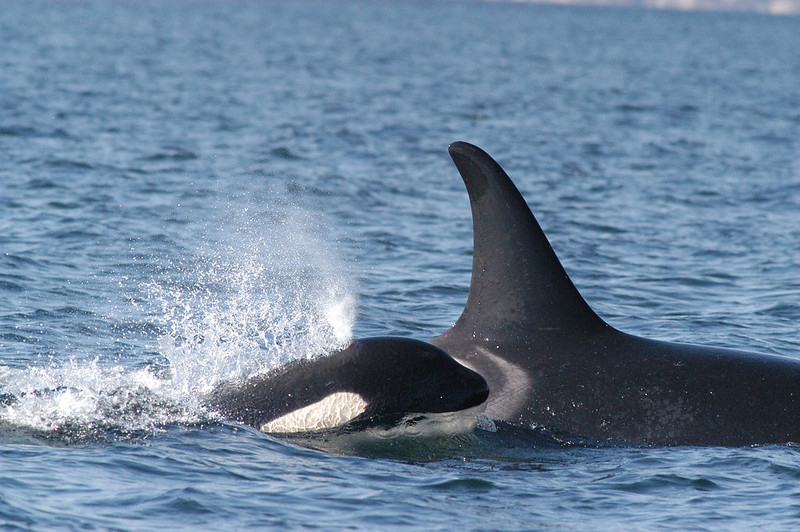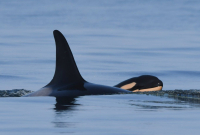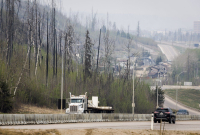Support strong Canadian climate journalism for 2025
After making big, specific promises to mitigate the environmental effects of the Trans Mountain pipeline, the federal government is watering down and slow-walking that commitment.
On May 23, tankers began transporting oil from the newly expanded pipeline through the Salish Sea, increasing oil tanker traffic sevenfold in the home of the critically endangered Southern Resident Killer Whale.
The federal government, in announcing the project’s approval, said it had an implementation plan for 16 non-binding recommendations made by the Canada Energy Regulator, which included a program to offset increased underwater noise from shipping traffic, loss of access to prey and contaminants in the water.
That was in 2019. In February, with the date looming for tankers to begin exporting though British Columbia’s coastal waters, Ecojustice sent an environmental petition to the federal government on behalf of multiple environmental groups to get an update on the recommendations.
Ecojustice received a joint response from Minister of Natural Resources Jonathan Wilkinson, Minister of Environment and Climate Change Steven Guilbeault, Minister of Fisheries, Oceans and the Canadian Coast Guard Diane Lebouthillier and Transport Minister Pablo Rodriguez.
The answer wasn’t what the groups hoped to hear.
“Unfortunately, those answers confirm that of the recommendations [that] were about marine impacts, and some of which were specifically about impacts on the Southern Resident killer whales, some recommendations haven't been implemented yet and don't have a timeline, and we can see from this response that they have no intention of fully implementing,” says Dyna Tuytel, staff lawyer with Ecojustice.
The response gave no timelines on some recommendations, like the offsetting program. Others like the regional cumulative effects management plan will not be fully implemented, despite the increased threat to the whales now that the expansion project is underway.
Regarding the recommendation to create a cumulative effects management plan for the Salish Sea, the government says it will wrap up knowledge building with Indigenous partners by next spring when funding ends, but there's no indication it will actually implement the plan — something Tuytel says the Salish Sea desperately needs as impacts from human activity build.
The offsetting program is similarly bogged down, she says. The government has been trying to figure out how the concept of offsetting noise would work. But there is no timeline for completing that framework, nor for implementing it. Meanwhile, the ships are already sailing through the whales’ critical habitat.
In an email statement to Canada's National Observer, Fisheries and Oceans Canada (DFO) stated that they are moving forward with an "Ocean Noise Strategy," with a draft expected to be released by summer 2024, and a final strategy and Federal Action Plan to follow in 2025.
In a separate statement to Canada’s National Observer, Transport Canada said that since 2018, the federal government has taken several actions through the Oceans Protection Plan, Whales Initiative or accommodation measures associated with the Trans Mountain Expansion Project, and has collaborated with marine industry partners to put measures in place to reduce underwater vessel noise, including voluntary slow down of vessels in the whales’ critical habitat. They say results in recent years indicate significant underwater noise reductions due to these slowdowns.
The measures are better than nothing, Tuytel says, but have not done enough to protect the whales from tanker traffic, including the noise from tankers that impedes their ability to communicate and use echolocation to find food. The animals are already nutritionally stressed and struggling to find prey, she noted.
The whales have declined from 99 individuals in 2001, when they were first listed as an endangered species, to 74 — a 25 per cent decline over the last 23 years, says Peter Ross, senior scientist and healthy waters program director with the Raincoast Conservation Foundation.
“To me, it’s a bellwether of our systemic collective failure to protect and recover this species,” Ross said. “We know much more than we did 23 years ago, and we've taken additional steps to study, monitor, and take action on some elements. But incrementally, each of those actions have been insufficient to pull together the entire story into a conservation success.”
Ecojustice is also awaiting response to a letter they sent in June on behalf of environmental groups to the minister of Fisheries and Oceans and the minister of Environment and Climate Change Canada, urging the federal government to issue an emergency order under the Species at Risk Act with “urgent measures to protect the Southern Residents from mounting threats,” something the groups previously requested in 2018.
Recently, a judge ruled that Guilbeault’s more than eight-month delay before recommending an emergency protection order for the northern spotted owl under the Species at Risk Act was “unreasonable.” Two of the critically endangered birds were discovered dead in May last year.
“The best thing that … the cabinet can do immediately is to implement the emergency order that our clients are asking for to take urgent action to protect the species given that these impacts are already underway, and something needs to be done quickly,” Tuytel says.
“We would like to see them take these recommendations that they undertook — so, that they formally promised to implement — more seriously.”






Comments